In a spin at Lyric, ‘My Fair Lady’ still leaves romance in lurch, but the show’s irresistible
Review: “My Fair Lady,” by Lerner and Loewe, at the Lyric Opera of Chicago through May 21. ★★★★
By Nancy Malitz
For more than a century, people have been arguing about the ending of George Bernard Shaw’s “Pygmalion,” the play behind Lerner and Loewe’s beloved musical “My Fair Lady.” Now the Lyric Opera of Chicago jumps into this amusing fray, but don’t expect the matter to be cleared up. When it comes to the cockney guttersnipe Eliza Doolittle and the phonetics professor who successfully passes her off as an aristocrat, the romantic stakes are still dizzy with spin.
In his day, Shaw delighted in shocking his readers with his acidly dry contention that society’s marriage laws enforcing monogamy were hypocritical, ghastly unfair to both sexes and especially enslaving to women, since their gender was deprived of both property and legal recourse.
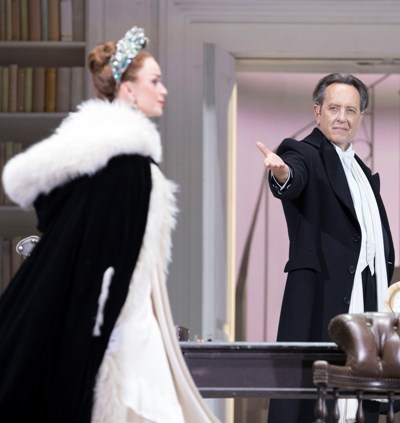 Shaw’s Eliza Doolittle is an emancipated heroine whose final triumph is to dump her professor in a fit of independence. But hardly anyone — starting with Shaw’s own early producers — has agreed on this ending, demanding an “almost-romance” between the brilliantly spirited antagonists at the very least.
Shaw’s Eliza Doolittle is an emancipated heroine whose final triumph is to dump her professor in a fit of independence. But hardly anyone — starting with Shaw’s own early producers — has agreed on this ending, demanding an “almost-romance” between the brilliantly spirited antagonists at the very least.
A sweet spot for love’s teetering totter was established in Lerner and Loewe’s 1956 musical, which debuted six years after Shaw died. Following a terrible row between Eliza and Henry, the rebellious student slips back into Henry’s study, where he, feigning calm, quietly asks, “Where the devil are my slippers?” leaving the possibility of reconciliation deliciously dangling as the curtain falls.
This production by Robert Carsen — conceived in 2010 for a Paris audience — ends as something more like a housewifely ’60s sitcom. At least Eliza doesn’t wriggle her nose. It’s an un-bewitching ending that undoubtedly gave Parisians one final chuckle over hopeless American taste before heading into the night for a bit of the pig and a glass of wine.
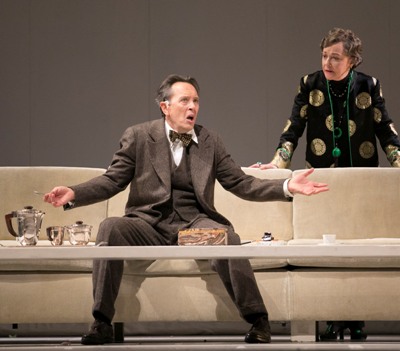 But never mind. The battle of the sexes is good for many more rounds before the current century’s out, and “My Fair Lady” will doubtless continue to offer slightly different denouements that Shaw, complaining from the grave, will insist have “dun ‘im in.”
But never mind. The battle of the sexes is good for many more rounds before the current century’s out, and “My Fair Lady” will doubtless continue to offer slightly different denouements that Shaw, complaining from the grave, will insist have “dun ‘im in.”
Lyric’s current “My Fair Lady” is rich in musical values and strong ensemble casting in the service of those famously witty lyrics that offer ample opportunity for Americans, in their turn, to chuckle over hopeless British men.
Case in point: Richard E. Grant was quite good at capturing Henry Higgins’ contradictory brilliance and self-deluding narcissism. A prize moment came late in the show, when the professor sidled downstage to perplexedly confess his changed impression of Eliza, to whom, he noted, he had become accustomed. The gasps of surprise in the house were audible as Henry blithely slipped that he was “grateful she’s a woman / And so easy to forget / Rather like a habit one can always break and yet / I’ve grown accustomed …”
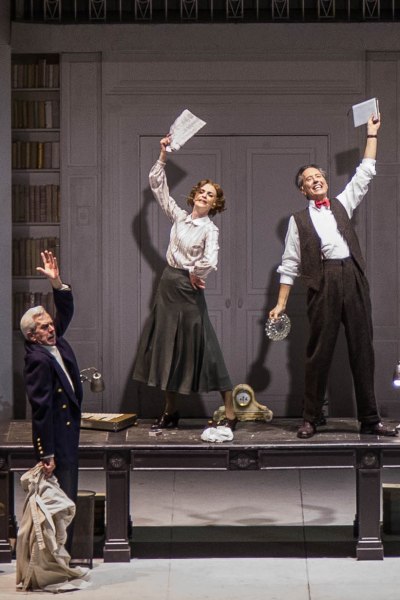 Likewise Lisa O’Hare, as the “squashed cabbage leaf” turned into a young lady so lovely she’s mistaken for a foreign princess, is a charmer with a good musical theater voice and fluid movements – the “Rain in Spain” ensemble number, when Eliza’s lessons with Higgins and his droll friend Pickering (Nicholas Le Prevost) finally begin to take hold – was a beautifully choreographed set piece that benefited from her balletic sensibility.
Likewise Lisa O’Hare, as the “squashed cabbage leaf” turned into a young lady so lovely she’s mistaken for a foreign princess, is a charmer with a good musical theater voice and fluid movements – the “Rain in Spain” ensemble number, when Eliza’s lessons with Higgins and his droll friend Pickering (Nicholas Le Prevost) finally begin to take hold – was a beautifully choreographed set piece that benefited from her balletic sensibility.
The line the Lyric always has to straddle, as these musicals come to the opera house, is the distinction between the two art forms. The sound in the Civic Opera House seems muffled for speech and just so-so for some of the singers on microphone. Yet “My Fair Lady” positively bloomed for the outstanding chorus, for Bryce Pinkham’s lovesick Freddy (a terrific tenor) and for the four men in the Cockney Quartet – opera singers all — who let ‘er rip in “Wouldn’t It be Loverly.” And then there was the marvelous benefit of a real acoustic orchestra – you almost never hear musical quality like that anywhere on Broadway. What often passes for an orchestra there is a harsh, over-amplified sound from maybe nine players doubling on various instruments and a keyboard-playing conductor.
I think the Lyric Opera’s musical project has continuing potential. These shows are serious works of the mid-century American musical stage worthy of the Lyric’s meticulous approach. But the technical hurdles remain. The company has begun an ambitious capital campaign for all sorts of infrastructure improvements in the stage house. Hopefully, this includes a speaker amplification system that will allow this company to tweak the acoustics for the benefit of these talky shows and their musical theater voices.
Another big issue for the Lyric – and this is also true for its operas – is the necessity of sharing the physical productions. Budgets no longer allow for custom-built shows designed to fit only the Civic Opera House like a glove. Over the years, the Lyric has formed relationships with other companies of similarly sized stages and budgets, to allow for some coordinated planning and shared costs, and the musicals will require a like approach
This “My Fair Lady,” designed for the significantly smaller 2,500-seat Théâtre du Châtelet in Paris, had a grandly austere aspect. However, there was an aloofness to it that was distancing, and it generally failed to make the best use of the stage’s forward area, although the full company “Ascot Gavotte,” in which Eliza and the stiff-lipped British watch the horses head for the finish, came off very well..
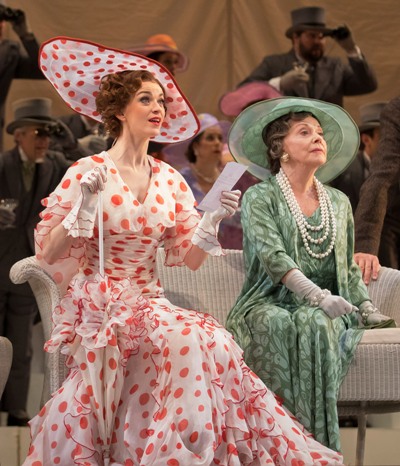 Fortunately, the Lyric’s excellent supporting cast was made up of big personalities capable of bridging the lip of the stage: Broadway actor Helen Carey and Chicago-based Cindy Gold were priceless as, respectively, Henry’s despairing mother and his long-suffering housekeeper Mrs. Pearce.
Fortunately, the Lyric’s excellent supporting cast was made up of big personalities capable of bridging the lip of the stage: Broadway actor Helen Carey and Chicago-based Cindy Gold were priceless as, respectively, Henry’s despairing mother and his long-suffering housekeeper Mrs. Pearce.
British singer Donald Maxwell, who played Eliza’s opportunistic father, Alfred P. Doolittle, is a wonderful character baritone often on the opera stage; his “Get Me to the Church on Time” was a solid hit that, like Bryce Pinkham’s love song for Freddy, “On the Street Where You Live,” shorted neither art form.
Related links:
- Performance location, dates and times: Details at TheatreInChicago.com
- Details of the 2017-18 season: Go to LyricOpera.org

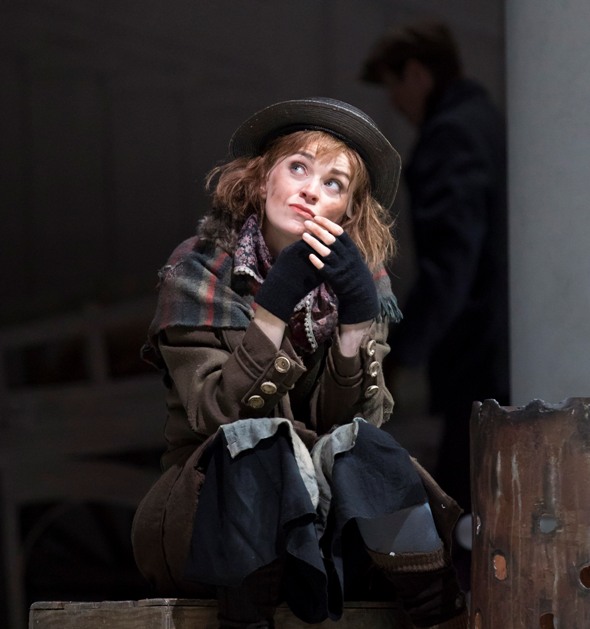

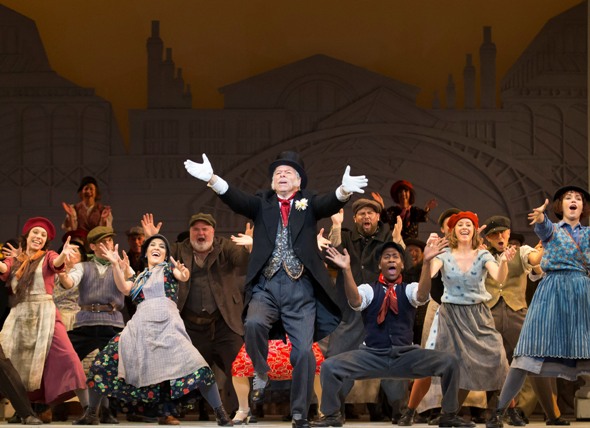

Beautiful theatrical production!